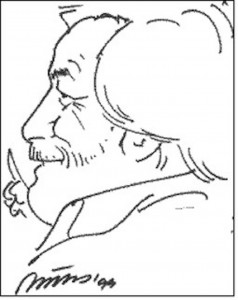Antonio Marturano

Antonio Marturano
This ILR issue is dedicated to Italy. Very interestingly, Italy has had an amazing fabric of leaders and ideas on leadership since the Romans: Italy indeed did not only provide all kinds of leaders (from Machiavellian-amoralist leaders to saint and value-centred leaders) but also many Italian scholars have helped us to think about leadership. From Marc Aurelius, Machiavelli, Gramsci, to Agamben, today, Italian scholars have provided tools with which to understand the leadership phenomena. On the other hand Caesars, the Church, the Renaissance, the Mafia, Mussolini and Fascism, leftist movements in the ‘70s, the Agnelli Family and today’s Berlusconism provide key features useful to understand leadership, leadership culture, followership and leaders’ behaviours.
Historically, authors such as Gramsci, Pareto and Mosca offered tools to understand leadership, which are today fundamental tools of leadership analysis. Notably, Gramsci offered the notion of hegemony that, far from becoming an obsolete concept in post-communist societies, represents a crucial concept to understand how leading forces in organisations keep control over followers. Capitalism, Gramsci suggested, maintains control not just through violence and political and economic coercion, but also ideologically, through a hegemonic culture in which the values of the bourgeoisie became the ‘common sense’ values of all. Thus a consensus culture developed in which people in the working-class identified their own good with the good of the bourgeoisie, and helped to maintain the status quo rather than revolt against it. Impression management is a powerful technique for a leader to exercise his or her hegemony over the group; Benito Mussolini built his image through media such as cinema and radio, and today Silvio Berlusconi has built his image through television. Grillo, the leader of a new Italian populist party (Movement 5 stars) is also exploiting the potential of the Internet. These both created a popular consensus around themselves. Some fundamental questions emerge: how important is the role of mass media in building hegemony and shaping a leader’s image? Is the Internet changing the way in which a leader’s image is created and perceived, and is the Internet changing folk’s perception of democratic rules? Will the way in which hegemony is created, change through the use of new media (or, rather than be imposed, will it emerge from followers)?
The present crisis (economic and political) has exacerbated Italian cultural contradictions: Italy is not just a country. It is an assembly of regional cultures resulting in – as Laszlo suggests in my interview included in this issue – an impossibility for a leadership and a general individualistic followership (this would seem an oxymoron). This idea is not new. Rather it seems one of the most often repeated refrains in Italian history since Dante’s The Divine Comedy: “Ah slavish Italy! Thou inn of grief, Vessel without a pilot in loud storm, Lady no longer of fair provinces, But brothel-house impure!” (Purgatory, VI, 78). Such a metaphor seems to be embodied in the Berlusconism creed – still popular in Italy. Berlusconi’s late personal leadership history is indeed characterized by sexual affairs, financial scandals and acrimony not only between actors within his own party but also in his own familiar “dynasty”.
Such an immense reservoir of leaders and leadership ideas provides conceptual contradictions that are even challenging established paradigms in leadership studies. Leadership studies indeed is a quite multidisciplinary field as it takes lessons from history, politics, narrative, philosophy, management, law, psychology, sociology, film studies and many other fields. Therefore, Italy with its own history, social and cultural complexity and contemporary political muddles, is a good field to test, rethink and improve leadership studies concepts and theories as Italy is seen as a sort of laboratory to understanding social trends.
A particular and quite fruitful standpoint for what concerns leadership is Italian film studies: Italy has one of the most important worldwide film industries, which led to the famous Italian Neorealism – a national film movement characterized by stories set amongst the poor and the working class, filmed on location, frequently using non-professional actors – which has led to Fellini’s La Dolce Vita. Such a movie is widely considered as one of the great achievements in world cinema and has set the contemporary standard idea of Italian lifestyle. Another important stream in Italian filmmaking is the so called Italian-style comedy, that is a set of movies having some common traits like satire of manners and a prevailing middle-class setting, often characterized by a substantial background of sadness that would dilute the comic contents. Mario Monicelli – one of the fathers of this film stream – who has never made any secret of his “faith” in the Italian Comedy, has claimed this genre as the one, more than any other, that could show to Italians their vices, dispel myths and taboos and therefore play a social and educational role.
The role of ethics in leadership studies, for example, went through different periods in which its weight in the field continuously changed. For Marcus Aurelius ethics and responsibility were fundamental ingredients for a would-be-leader, while in Machiavelli, apparently, amoralism was a fundamental characteristic for a leader whose only aim was to continue governing a nation. In more recent times Italian political individuals such as Il Divo Giulio Andreotti or, in business field, Eni’s founder Enrico Mattei, based their leadership performances on crude cynicism, though they were living in a society based on a welfare state economy. Moreover, in the just-past-climate, the rise of Berlusconism (understood as a leadership model in both business and politics based on the ideal of the self-made man) is accompanied by a leadership crisis in left parties and in alternative (that is, based on different values) leadership models in business. However, the worldwide economic crisis has changed this vision. Many voices are now indeed asking for rethinking Italian values and norms, from different standpoints ranging from the return to Christian values (the Catholic Church) to the reengineering of values on the basis of a consumer culture making that compatible with market needs. The actual Italian Premier Mario Monti has changed the Italian folklore on leaders from a kind of King Sun style to a drier and less show-centric style similar to what in Anglo-Saxon countries is called “understatement” or “low profile” style more in line with the actual financial crisis.
Organizations such as the Catholic Church and Mafia have provided paradoxical examples of leadership phenomena. The Church itself provides complex instances of leadership processes that have contributed to the development and institutionalisation of the central leadership concept of Charisma since St. Paul. The Mafia is the archetypal secret organization, not only because of its hidden membership and its still ancestral initiation rites and secrecy laws (such as omertà – code of silence), but also because of its hidden and variable hierarchical structure that enables it to create merciless and eccentric leaders. The Godfather or The Sopranos provide a fictional characterization of Mafia leaders’ authoritarian style and personal characteristics.
Complexity – historical and contemporary – on all levels is therefore the key concept to understand Italy. Such an intricate Italian panorama – I would guess – will shed new light into the new technological, rights hungry, anarchist, globalistically placed, forms of leadership spreading worldwide.
Additional Comments:

Mark McCaslin

Russ Volckmann
We have deep appreciation for the work that Antonio Marturano has done in guest editing the Italian special issue of ILR. As you can see in the Table of Contents, there are many additional features in this issue: columns, reviews and more. We hope you will take advantage of the opportunity to comment on this material.
Thanks,
Russ and Mark

ciao Antonio,
really good one !
Like it so much and I do think same way!
We are actually forming new fondation concerning the coocreate in term of associationims, natural behavior in mediterranean countries.
The future belong to Italy format cause represents the diversity itself.
I’d like have a conversation with u on skype maybe.
can we?
Mich